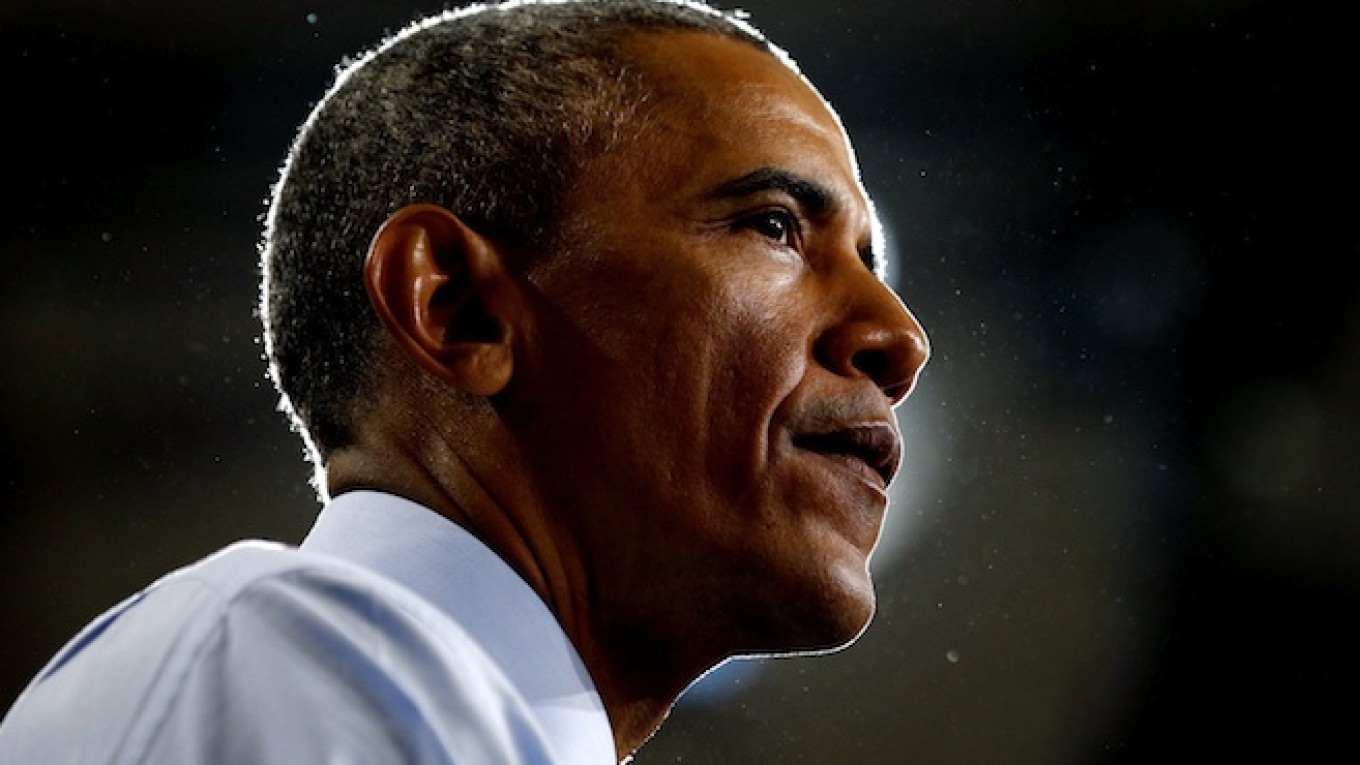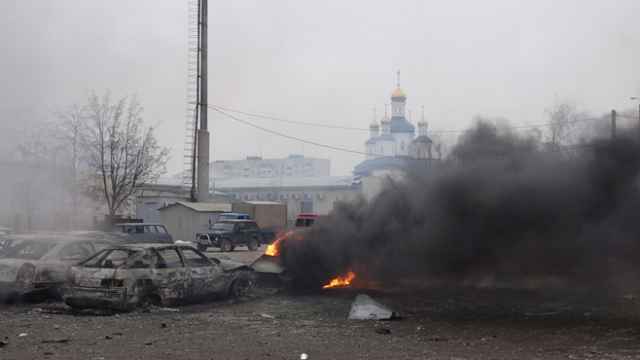NEW DELHI/KIEV — Pro-Moscow rebels, backed by what NATO says is the open participation of Russian troops, pressed on with their offensive on Sunday after restarting the war in eastern Ukraine with the first all-out assault since a truce five months ago.
U.S. President Barack Obama said Washington was considering all options short of military action to isolate Russia. The European Union called an emergency meeting of foreign ministers of its 28 member states.
"We are deeply concerned about the latest break in the cease-fire and the aggression that these separatists — with Russian backing, Russian equipment, Russian financing, Russian training and Russian troops — are conducting," Obama told a news conference during a visit to India.
"I will look at all additional options that are available to us short of military confrontation and try to address this issue. And we will be in close consultation with our international partners, particularly European partners."
NATO accuses Moscow of sending troops to fight on behalf of rebels in territory the Kremlin has dubbed "New Russia" in a war that has killed more than 5,000 people.
In some of the strongest language ever from Brussels, Donald Tusk, the former Polish prime minister who now presides over EU summits as European Council president, denounced "appeasement" of Moscow, a word with unmistakable World War II connotations.
"Once again, appeasement encourages the aggressor to greater acts of violence. Time to step up our policy based on cold facts, not illusions," Tusk said on Twitter.
Fighting in eastern Ukraine had mainly died down since a September cease-fire, but in recent days the war has returned in full force, with the rebels announcing the effective end of the truce and an offensive to expand territory under their control.
On Saturday rebels attacked Mariupol, a strategic Black Sea port of 500,000 people and the biggest city still in government hands in the two rebel-dominated eastern provinces. Kiev said 30 civilians were killed in shelling.
Rebels launched new attacks on Sunday against government positions elsewhere along the front line that winds through the two restive provinces, the Kiev army said.
"Rebels are attacking the positions of anti-terrorist operation troops extremely intensively, using artillery, mortars, grenade launchers, tanks," military spokesman Andriy Lysenko said in a televised briefing.
He said four Ukrainian servicemen had been killed and 17 injured in the past 24 hours and that rebel attacks on the town of Debaltseve, northeast of separatist-held Donetsk, had been particularly fierce.
"Because of constant shelling in the past few days, there are dead and injured among local residents. Around 60 homes have been destroyed or damaged," he said without giving a figure for the number of casualties.
Rebel leader Alexander Zakharchenko said Saturday that the separatists planned to encircle Debaltseve, which has a population of about 26,000.
New Sanctions
After months in which European politicians had been debating whether it was time to start rolling back sanctions, the talk now is of how to tighten them.
"If the Russian government cannot prove that it is making verifiable progress towards a de-escalation of the situation, we'll have to talk about more severe sanctions unfortunately," said German politician Karl-Georg Wellmann, a foreign policy specialist for Chancellor Angela Merkel's Christian Democrats.
Merkel called the attack on Mariupol "a clear and totally unjustifiable violation of the cease-fire" in telephone calls with the presidents of Ukraine and Russia on Sunday, government spokesman Steffen Seibert said, and asked Russia's Vladimir Putin to prevent further escalation.
The rebels say government forces have been hitting cities with artillery, killing civilians and forcing them to advance to push Kiev's troops further from population centers. Moscow blames the West for failing to force the Kiev government to talk to the rebels.
Foreign Minister Sergei Lavrov spoke on Sunday to U.S. Secretary of State John Kerry and EU foreign affairs chief Federica Mogherini. He told both that the escalation in violence was a result of Kiev refusing a proposal laid out in a letter from Putin to Ukraine's Petro Poroshenko to withdraw heavy weapons away from the demarcation line.
Lavrov blamed the escalation of violence in east Ukraine on what he called "constant shelling of populated areas by Ukrainian army." He called on Kerry to press Kiev to renounce "betting on the military scenario."
Mogherini called an emergency meeting of EU foreign ministers for Thursday to discuss Ukraine and the Mariupol assault.
Russia says it has not sent troops into Ukraine, and any Russians there are volunteers. NATO says this is nonsense.
"Russian troops in eastern Ukraine are supporting these offensive operations with command and control systems, air defense systems with advanced surface-to-air missiles, unmanned aerial systems [drones], advanced multiple rocket launcher systems and electronic warfare systems," NATO Secretary-General Jens Stoltenberg said.
"I strongly urge Russia to stop its military, political and financial support for the separatists, stop destabilizing Ukraine and respect its international commitments," he said.
Last week Ukrainian President Petro Poroshenko said Russia had 9,000 troops stationed in his country.
A Message from The Moscow Times:
Dear readers,
We are facing unprecedented challenges. Russia's Prosecutor General's Office has designated The Moscow Times as an "undesirable" organization, criminalizing our work and putting our staff at risk of prosecution. This follows our earlier unjust labeling as a "foreign agent."
These actions are direct attempts to silence independent journalism in Russia. The authorities claim our work "discredits the decisions of the Russian leadership." We see things differently: we strive to provide accurate, unbiased reporting on Russia.
We, the journalists of The Moscow Times, refuse to be silenced. But to continue our work, we need your help.
Your support, no matter how small, makes a world of difference. If you can, please support us monthly starting from just $2. It's quick to set up, and every contribution makes a significant impact.
By supporting The Moscow Times, you're defending open, independent journalism in the face of repression. Thank you for standing with us.
Remind me later.






